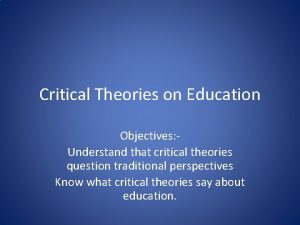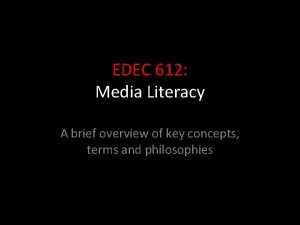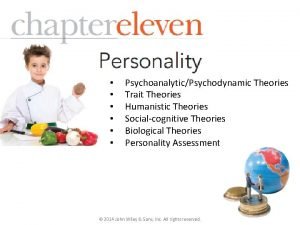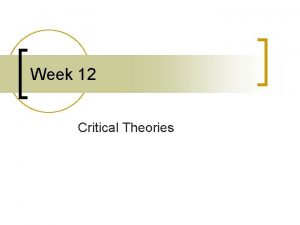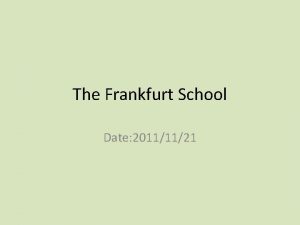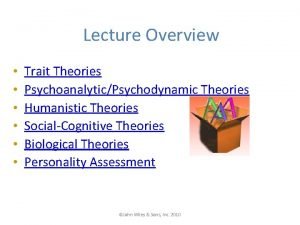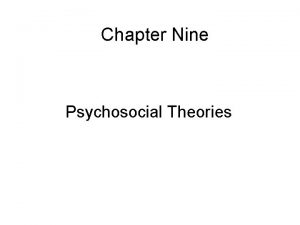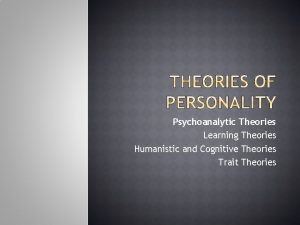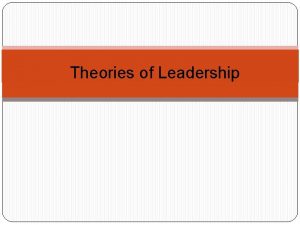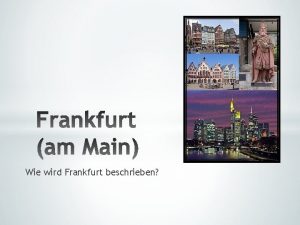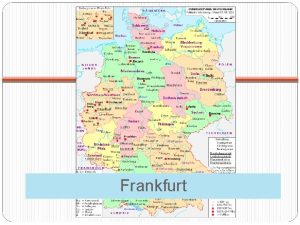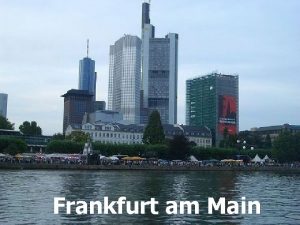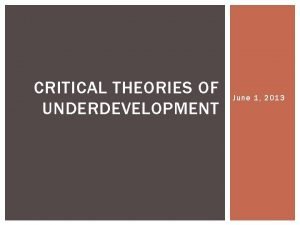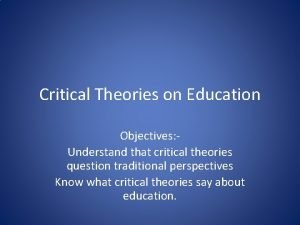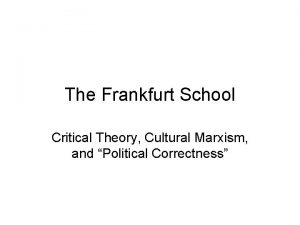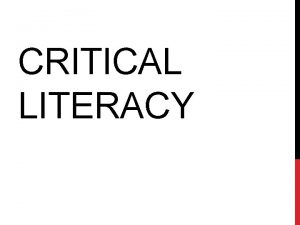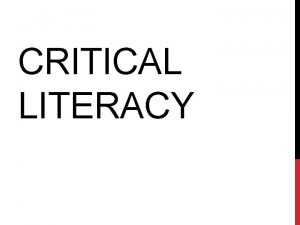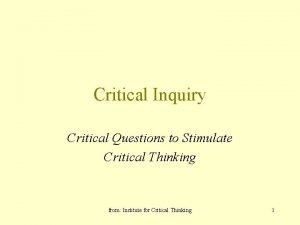Critical theories Frankfurt school The Frankfurt School known
































- Slides: 32

Critical theories Frankfurt school • The Frankfurt School, known more appropriately as Critical Theory, is a philosophical and sociological movement spread across many universities around the world. • It was originally located at the Institute for Social Research (Institut für Sozialforschung), an attached institute at the Goethe University in Frankfurt, Germany. • The Institute was founded in 1923 thanks to a donation by Felix Weil with the aim of developing Marxist studies in Germany.

• After 1933, the Nazis forced its closure, and the Institute was moved to the United States where it found hospitality at Columbia University in New York City. • The academic influence of the critical method is far reaching. • Critical Theory provides a specific interpretation of Marxist philosophy with regards to some of its central economic and political notions like commodification, reification, fetishization and critique of mass culture.

• Some of the most prominent figures of the first generation of Critical Theorists were • Max Horkheimer (1895 -1973) • Theodor Adorno (1903 -1969) • Herbert Marcuse (1898 -1979) • Walter Benjamin (1892 -1940) • Friedrich Pollock (1894 -1970) • Leo Lowenthal (1900 -1993) • Eric Fromm (1900 -1980)

Critical theory The most extensive discussions of the epistemology of critical theory occurred in the post. Marxist debates within the Frankfurt School, and Raymond Geuss presents those debates with great clarity in The Idea of a Critical Theory: Habermas and the Frankfurt School (1981) Here is the general definition that Geuss offers: A critical theory is a reflective theory which gives agents a kind of knowledge inherently productive of enlightenment and emancipation.

• The idea of enlightenment here is related to achieving accurate knowledge of one's place in the world -- "to determine what [one's] true interests are". • And emancipation in this context means having the epistemic tools necessary to make one free -- to change the world and the structure of governing social relations in ways that increase one's ability to live and develop freely.

• Critical theory is a body of knowledge that permits people to move in the direction of greater autonomy and self-definition • The paradigm case of a critical theory, according to Frankfurt School theorists, is Marx's presentation of the political economy of capitalism.

• Critique of Political Economy • It provides a basis for understanding how exploitation takes place within the seemingly free social relations of capitalism; • how the class system works; • how the fetishism of commodities works to systematically obscure the exploitation and inequality inherent in the property relations of capitalism; • and how the dynamics of capitalist competition lead to central tendencies in capitalist society (industrial reserve army, falling rate of profit, economic poverty).

Political Economy in Cultural context • A focus on the production of popular culture and the forces behind it is the topic of political economy studies, which specifically examine interconnections among economic interests, political power, and how that power is used. • Among the major concerns of political economy studies is the increasing conglomeration of media ownership. • The increasing concentration of ownership means that the production of media content is being controlled by fewer and fewer organizations, investing those companies with more and more power.

• Political economy studies work best when combined with textual analysis and audience studies, which provide context for understanding the cultural content of a media product, its production process, and how the audience responds.

• For example, a major media corporation may, for commercial reasons, create a film and market it through a number of venues (political economy), but the film’s meaning or popularity makes sense only within the historical and narrative contexts of the culture (textual analysis), and it may be interpreted by various audiences in ways both anticipated and unexpected (audience studies).

The critique of ideology • The critique of ideology is a core function of critical theory. • Ideologies are the systems of ideas and belief that class societies have developed to re-describe and conceal the real workings of the social order. • Individuals in every historical period require mental frameworks in terms of which to understand represent the social structures.

• Human beings are reflective, cognitive actors. • Marx and theorists of the Frankfurt School described these mental frameworks as ideologies; • They worked on the assumption that ideologies are tilted in favor of specific powerful groups in society. • Religion and myth serve ideological functions. • In the United States there are certainly ideological systems of belief in terms of which many people understand immigration, race relations, and urban-rural inequalities.

• Critique of ideology is an essential part of critical theory in the definition offered above. • When individuals are preoccupied with social beliefs and expectations that conform badly to the real nature of their social relations, they achieve neither enlightenment nor emancipation.

• In simple terms Critique of Ideology represents criticism of dominant ideology

• In other words, critical theories are aimed at furthering a set of fundamental human values (freedom, emancipation, enlightenment); but they are intended to have rational epistemic force as well. • It is expected that theorists and users of theory will give an honest adhere to evidence and logic, and will be prepared to abandon aspects of their theories if they are refuted. • And Geuss admits that this set of epistemic values are in some tension with the democratic and enlightenment values embodied in the critical theory.

Media- Culture manufacturing Industry

Introduction • Culture identifies the ways in which people live and represent themselves which includes fashion, sports, architecture, education, religion and science. • It also includes a society’s mode of communication: The process of creating symbol systems that convey information and meaning such as symbols become culture manufacturing machines. • When we listen to music, read a book, watch a TV or scan internet, we try to connect to something or someone. We interpret it in our way and absorb certain things in our lifestyle.

• The idea of a 'culture industry' was first presented in an essay called 'The Culture Industry: Enlightenment as Mass Deception'. • Published in 1944 by philosophers Theodor Adorno and Max Horkheimer, theory conceptualized culture as something not only manufactured but also a tool for social control. • Adorno and Horkheimer identified 'culture' as the unified set of ideas and values prevalent in a society and reflected through film, television, theatre, radio etc. -- the entertainment media.

• Earlier, it had been generally understood that culture comes first and is then portrayed through the entertainment media. • However, this essay offers the alternate view that culture is systematically 'constructed' and then fed to consumers who fall in line with the ideas and roles ascribed to them. • What we understand from Adorno and Horkheimer's theory as culture is partially created and then reinforced by the entertainment industry, a system uniform as a whole and in every part. • Under monopoly, all mass culture is identical.

Identical content by cultural industry • This monopoly can be of various natures, such as those of • Economic, Intellectual or technological dominance. • For example, television producers often defend the sameness of content and treatment in mainstream programming by pointing out that the centers of production are few while the consumers number in millions.

• Adorno and Horkheimer point out that “No mention is made of the fact that the basis on which technology acquires power over society is the power of those whose economic hold over society is greatest. ” A technological rationale is the rationale of domination itself. " • The technology of the culture industry is no more than the achievement of standardization and mass production. • "Talented performers belong to the industry long before it displays them, otherwise they would not be so eager to fit in, " they point out.

Absence of Revolutionary ideas • This helps one to understand, for example, why the role ascribed to housewives in the overwhelming majority of television serials is that of subservience and of being the carer/nurturer. • According to the culture industry theory, it is necessary that such a role be impressed upon the consumers' minds because only then will the societal status quo be maintained -- the status quo that is profoundly in the interests of the people and institutions already in positions of dominance. • Put another way, it is not in the interests of the ruling classes, who in turn control the culture industry, to present revolutionary ideals because this may, in turn, lay ground for a revolution.

• Horkheimer and Adorno contend that industrially produced culture robs people of their imagination and takes over their thinking for them. • The Culture Industry delivers the "goods" so that the people then only have left over the task of the consuming them. • Through mass production, everything becomes homogenized and whatever diversity remains is constituted of small trivialities. • Everything becomes compressed through a process of the imposition of schemas under the premise that what's best is to mirror physical reality as closely as possible. • Psychological drives become stoked to the point to where redirection is no longer possible.

Movies as industries • Movies serve as an example. "All films have become similar in their basic form. • They are shaped to reflect facts of reality as closely as possible. • Even fantasy films, which claim to not reflect such reality, don't really live up to what they claim to be. • No matter how unusual they strive to be, the endings are usually easy to predict because of the existence of prior films which followed the same schemas. Also, for example, erotic depictions become so strong and so pronounced that a transformation to other forms is no longer possible. "

• Multitudes tend to imitate their favorite stars in every way. They like to copy their dressing quotient, style and general demeanor. • An example can be of Lage Raho Munna Bhai, that started a wave of Gandhigiri all over the country. People started walking on the forgotten path of Gandhism. It was a revival of a legend who otherwise had been restricted to just a national holiday. • Depicting marriage as a good Social Institution. • Male and female should do every efforts to save their marriage.

• Depicting two different community people marrying each other cannot survive in the Indian society. E. g. Ishaqzaade, Ram-Leela • Imaginary love stories are depicted. E. g. Hasi to fasi

• The way mass media works as a culture manufacturing industry can be seen in the realm of fashion and language. • In Vogue, styles are only those which are created by leading fashion designers or are worn by mainstream actor. • Slangy speaking style in speaking and speech with a tinge of new wave culture has become the order of the day. Books by young writers and English movies owe to this transformation.

Defrauding of the masses • The Culture Industry argument is often assumed to be fundamentally pessimistic in nature because its purveyors seem to condemn "mass media" and their consumers. • However, for Adorno, the term "Culture Industry, " does not refer to "mass culture, " or the culture of the masses of people. • But on the contrary, such involvement of the masses is only deceptive, or a type of seeming democratic participation. • Adorno contends that what is actually occurring is a type is "defrauding of the masses. "

• Horkheimer and Adorno deliberately chose the term "Culture Industry", instead of "mass culture" or "mass media". • "The culture industry perpetually cheats its consumers of what it perpetually promises. " • Horkheimer and Adorno, above all, in their critical analyses, delve into what they call "the fraying of art" and the "de-artification of art, " and discuss how the arts are defused by the Culture Industry. • Works of art have become commodified. According to Critical Theory, "selling out" is not the decisive factor involved, but rather it's the manner in which art is commodified and how art and culture are changed that is the crucial issue.

• "Culture today is infecting everything with sameness. " • For Adorno and Horkheimer, destabilization has become no longer possible.

Culture manufacturing includes: • Ethics • Relationships • Language • Religion • Fashion • Living style • Food habits • Education

• Music and Dance • Folk culture • Festivals • Rituals • Global culture
 Critical semi critical and non critical instruments
Critical semi critical and non critical instruments Spaulding classification system
Spaulding classification system Critical theories
Critical theories Critical reading meaning
Critical reading meaning Frankfurt school
Frankfurt school Hình ảnh bộ gõ cơ thể búng tay
Hình ảnh bộ gõ cơ thể búng tay Bổ thể
Bổ thể Tỉ lệ cơ thể trẻ em
Tỉ lệ cơ thể trẻ em Gấu đi như thế nào
Gấu đi như thế nào Thang điểm glasgow
Thang điểm glasgow Hát lên người ơi alleluia
Hát lên người ơi alleluia Môn thể thao bắt đầu bằng chữ đua
Môn thể thao bắt đầu bằng chữ đua Thế nào là hệ số cao nhất
Thế nào là hệ số cao nhất Các châu lục và đại dương trên thế giới
Các châu lục và đại dương trên thế giới Công thức tiính động năng
Công thức tiính động năng Trời xanh đây là của chúng ta thể thơ
Trời xanh đây là của chúng ta thể thơ Mật thư anh em như thể tay chân
Mật thư anh em như thể tay chân Làm thế nào để 102-1=99
Làm thế nào để 102-1=99 độ dài liên kết
độ dài liên kết Các châu lục và đại dương trên thế giới
Các châu lục và đại dương trên thế giới Thể thơ truyền thống
Thể thơ truyền thống Quá trình desamine hóa có thể tạo ra
Quá trình desamine hóa có thể tạo ra Một số thể thơ truyền thống
Một số thể thơ truyền thống Cái miệng bé xinh thế chỉ nói điều hay thôi
Cái miệng bé xinh thế chỉ nói điều hay thôi Vẽ hình chiếu vuông góc của vật thể sau
Vẽ hình chiếu vuông góc của vật thể sau Thế nào là sự mỏi cơ
Thế nào là sự mỏi cơ đặc điểm cơ thể của người tối cổ
đặc điểm cơ thể của người tối cổ Thứ tự các dấu thăng giáng ở hóa biểu
Thứ tự các dấu thăng giáng ở hóa biểu Vẽ hình chiếu đứng bằng cạnh của vật thể
Vẽ hình chiếu đứng bằng cạnh của vật thể Vẽ hình chiếu vuông góc của vật thể sau
Vẽ hình chiếu vuông góc của vật thể sau Thẻ vin
Thẻ vin đại từ thay thế
đại từ thay thế


